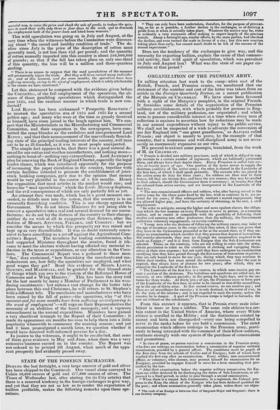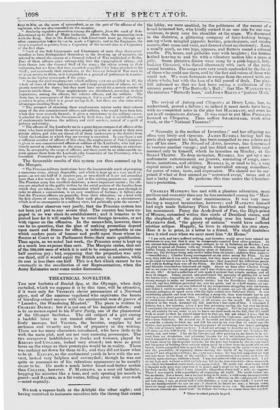ORGANIZATION OF THE PRUSSIAN ARMY.
IN calling attention last week to the comparative cost of the British, French, and Prussian armies, we mentioned that our statement of the number and cost of the latter was taken from an article in the Foreign Quarterly Review, on a recent publication of the Marquis DE CHAMBRAY. We have since been favoured with a sight of the Marquis's pamphlet, in the original French. It furnishes some details of the organization of the Prussian military establishment, with which probably few persons in Eng- land, not of the military profession, are acquainted ; and which seem to possess considerable interest at a time when every man of reflection is anxious to ascertain how far reductions may be made in our annual expenditure without injury to the public service. We shall not be suspected of a wish to advocate the conversion of our fair England into " one great guardhouse," as ALFIERI called Prussia; our object is merely to prove, by the example of that country, that a numerous and well-disciplined army is not neces- sarily so enormously expensive as our own. We proceed to extract some passages, translated, from the work of M. DE CHAMBRAY.
" Prussia is divided into military provinces, each of which is obliged to sup- ply recruits to a certain number of regiments which are habitually garrisoned there, and always have their depots there. Every Prussian is called into ser- vice at twenty years of age. One portion of the levies serves to supply the skeletons (cadres) of the active army ; the other is classed in the Landwehr of the first ban, of which I shall speak presently. The recruits who arc placed in the active army do duty for three sears; the soldiers are then sent to their homes, till they are twenty-five, mai form the war reserve ; they may be recalled to their colours, should the Government deem it necessary ; at twenty-five they are released from active service, and are incorporated in the Landwehr of the first ban.
" The non-commissioned officers and soldiers, who, after having served in the active army for the three years fixed by the law, wish to continue in it, are in- listed for six years; if they subsequently contract a second engagement, they are allowed higher pay, and have the certainty of obtaining, in the end, a civil employment.
"In order to mitigate, among the higher and more opulent classes, the obliga- tion which the law imposes on every Prussian to serve in person, as a common soldier, and to render it compatible with the possibility of following their studies and entering into other professions than the military, the Government authorizes voluntary engagements, on certain conditions.
" Young men who are desirous of following the military career, may inlist at the age of seventeen years in the corps which they select, if they can Prove that they have in the Gymnasium proceeded as far as the second class, or if they un- dergo an examination which certifies that they possess that degree of instruction. Six months afterwards, they may go through the examination requited to be made an Ensign;* and it is from these Ensigns that the Sub-Lieutenants are selected. Those, on the contrary, who are not willing to enter into the army, obtain permission to inlist on the condition of clothing and equipping them- selves at their own expense ; but not until they have undergone an examination certifying that they have passed through the first course of instruction requisite; they are only bound to serve for one year, during which they may continue to follow their studies, but must attend the military exercises. After the year is expired, they obtain leave of absence for two years; after which, they are classed in the Landwehr of the first ban.
" The Landwehr of the first ban is a reserve, in which none receive pay ex- cept a portion of the skeletons. The battalions and squadrons are called out, for exercise, at two different periods; in the spring for eight days, and in the au- tumn for three weeks. At thirty yea; s of age, the Prussians cease to form part of the Landwehr of the first ban, in order to be classed in that of the second ban, up to the age of thirty-nine. In this second reserve, no one receives pay; and there are no assemblages for exercise; it is only destined, in the event of war, to do the duty of the interior; and is not expected to meet the enemy, unless the country be in danger. A part of the Prussian troops is lodged in barracks, the rest are billeted on the inhabitants."
From this extract it appears, that in Prussia every male inha- bitant is more or less a soldier. The same rule obtains to a cer- tain extent in the United States of America, where every White citizen is enrolled in the Militia ; and the distinctions created by money and birth are disregarded—everyone being compelled to serve in the ranks before he can hold a commission. The strict examination which officers undergo in the Prussian army, previ- ously to being intrusted with the command of their fellow-soldiers, contrasts strongly with our system of the purchase of commissions and promotions.
" In time of peace, no person receives a commission in the Prussian army, who does not undergo an examination before a commission of superior military examination, presided by a general officer. The candidates must be pupils of the first class from the schools of Cadets and of Ensigns; both of whom have reached the first step after an examination. Every soldier, non-commissioned officer, or volunteer, who chooses, may present himself for examination for an Ensigncy, provided he engages himself to serve for a term exceeding that pre- scribed by the law.
" After their examination before the superior military commission, the En- signs are either declared fit for discharging the duties of Sub-Lieutenant, or ad- journed to a fixed period, in order to pass througha second examination, " When there is a vacant Sub -Lieutenantcy in a regiment, the Colonel pro- poses to the King the oldest of the Ensigns who has been declared qualified for the post ; and whose nomination generally takes place, unless there are objec- t The rank of an Ensign is between that of Sergeant-Major and Sergeant ; there is one in every company. *ions to Win on the. score of misconduct„or on the part of-the officers of the regiment, who are also consulted on the occasion. Seniority regulates promotion among the officers, from the rank of Sub- ',,,tieutenant up to that of Major inclusive. Above that, the nomination rests ;with the King. But in the Artillery a Sub-Lieutenant must go through an- other. examination before he can be made a Captain; and in the Engineers, the sante is required in passing from a Captaincy of the second class to a Captaincy of the first claw..
" Fria of the Sub-Lieutenants and Lieutenants of more than three years' standing as have.diStinguished themselves in the drawing up of memoirs, are selected to attend the courses of a General School of War established at Berlin. Part of these officers enter subsequently into the topographical offices; and from thinMe into the General Staff of the army ; the others return to their regiments, but are from that time regarded as qualified for being attached to the Staff ; and eventually their attendance at the General School of War must be of groat service to them, as it is regarded as a ground of preferencd in nomina- tions to the higher comtnands.of the army. " Among the civil employments which military men are qualified to fill, the avhole of some of these employments, and a large proportion of others, are ex- pressly reserved for them ; but they must have served for a certain number of years to entitle them. These employments are distributed, according to their importance, among the officers, the inferior officers, and the soldiers. The State has, in consequence of this arrangerncot, but a small number of retiring pensions to give, which is a great sating to it; but there are also some other 'advantages resulting from it.
" The prospect of obtaining these employments retains under their colours many of the non-commissioned officers and soldiers, who would have been lost, when they were scarcely formed; it gives a consistency to the military career, it attaches the artily to the Government by fresh ties ; and it establishes it sort of confraternity between the military and civil services, instead of a spirit of Jealousy and rivalry.
" The officers of the Landwehr are in a great degree composed of officers of the army who have retired from the service, usually in order, to attend to their own private affairs, and who are almost all of them landowners in the district from which the battalion in which they are serving is recruited. In case there is not a sufficient number of officers of this class, the employment of Sub-Lieutenant is given to non-commissioned officers or soldiers of the Landwehr, who had pre- viously served as volunteers in the army ; but they must undergo an examina- tion, be accepted by the corps of officers, and there must be no unfavourable re- ports against them fromthe Landreth cthe Councillor of the Province), who is consulted. Promotion goes by seniority."
The favourable results of this system are thus summed up by the Marquis.
" The Prussian military institutions have the incontestable merit of procuring a numerous army, always disposable, and which is kept up at d very small ex- pense—as not one half of it receives pay, as two-thirds of it are not assembled more than a few weeks in the year, and aS few retiring pensions are granted. The Prussian army has excellent skeletons, a most important matter ; the offi- cers are attached to the public welfare by the social portion of the families from which they are taken,—for the examination which they must pass through in order to obtain a commission, is an easy condition of fortune; it follows also that the Prussian officers are genetally,,ilum their education, on a level with the first classes of society, in which their rank places them ; a circumstance which is of no consequence in a. military view, but politically quite the reverse."
'Our author'observes very justly,' that the Prussian system has not been yet put to any severe trial. The country has been en- gaged in no war since its establishment; and it remains to be proved how far it will enable her 'to resist foreign invasion, or act with vigour on the offensive. In the meanwhile, however, there can be no question, that the plan of making promotion depend upon merit and fitness for office, is infinitely preferable to one which confers posts of honour and profit upon those whose in- fluence at Court or in Parliament forms their main qualification. Then again, as we noted last week, the Prussian army is kept up at a:much less expense than ours. The Marquis states, that out of the 300,000 men of which it is said to be composed, scarcely one half receives pay ; but, supposing that the proportion was only one third, still it would equal the British army in numbers, while its cost is less than one half. This is a fact which cannot be too constantly in the recollection of our Representatives, when the Army Estimates next come under discussion.



















 Previous page
Previous page